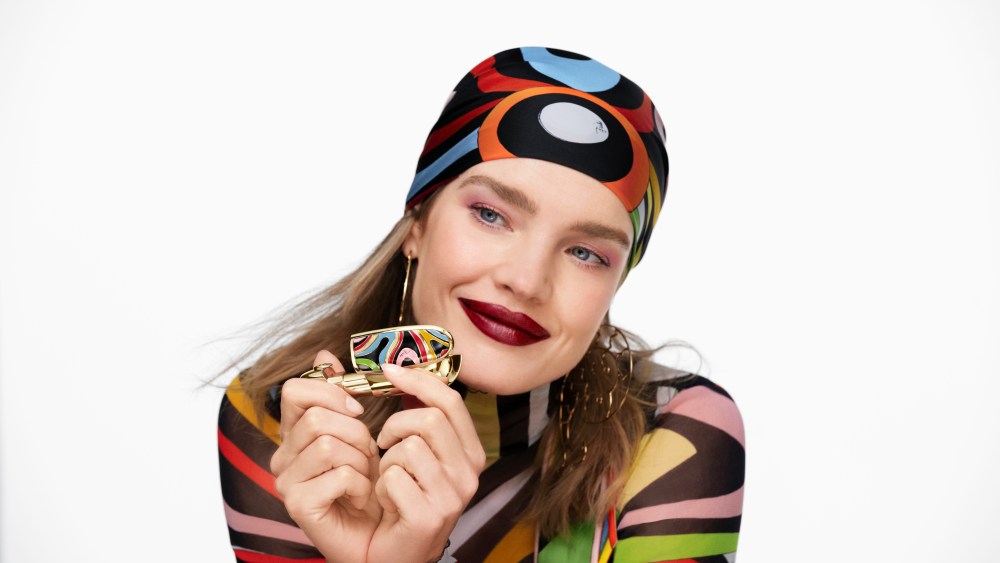“Got my body done / The doctor did a great job,” Yeri Mua sings in Spanish in front of a row of microphones. The press conference-like scene is from the rising Mexican star’s music video “Traka,” where she hits back at her critics. Mua is short for “makeup artist,” which is how she got her start before amassing millions of followers on social media thanks to her frank personality. Mua has never shied away from any topic in her live streams or her songs, including the cosmetic surgeries she’s had.
“‘Traka’ is a satire on all the hate I’ve received and all the things that people have said about me,” Mua says of her first release with Sony Music México. “I’m going to keep being myself, and they can keep fighting among themselves.”
Before becoming Yeri Mua, she was born Yeri Cruz Varela in Veracruz, Mexico, and she remembers her fascination with makeup starting at a young age. After watching makeup tutorials on YouTube, Mua started taking cosmetology courses at 15. Her online persona, Yeri Mua, was born a year later when she began uploading her own makeup tutorial videos. As she quickly became a social media star, she also had to deal with the struggles that come with growing up online as a teen influencer.
“Being a very young and stupid person on social media, I’ve made many mistakes,” she says. “That also led to having problems with myself and doubts about myself. Your self-esteem can easily be destroyed on social media. It could be an ugly comment that makes you crack. What has helped me the most is going to therapy, seeing a psychiatrist, and the support of my family.”
“Your self-esteem can easily be destroyed on social media.”
These days, Mua has more than 12 million followers on Instagram and 24 million followers on TikTok, and the love she receives drowns out the hateful comments that no longer faze her. At 22 years old, she is secure in who she is and focused on being a fierce woman like her Y2K idols – Britney Spears, Christina Aguilera, and the Pussycat Dolls. Another doll the Yeri Mua persona is based on is Bratz. In her livestreams on social media, she is known for showing off her outfits and makeup while talking about gossip, love, sex, and chacales (Mexican slang for “bad boys”).
“I think people connect with me because I have my own style,” she says. “It’s more because I’m very honest. I don’t have a filter. . . . There’s no shame here because I’m a very open person. They’re going to see someone being authentic.”
Mua’s very open about one topic in particular that’s often seen as taboo: plastic surgery. In her livestreams, she has talked about previously getting rhinoplasty and liposuction, as well as breast implants. She also filmed herself in the hospital before the procedures and showed the recovery process. She’s adamant that she isn’t encouraging anyone to undergo cosmetic surgeries; she just wants to destigmatize the conversation around it.
“Before I had any surgeries done, I believed those people I followed on Instagram were all natural, and that traumatized me,” she says, referring to online influencers. “I felt bad about myself. That’s not fair to their followers online. When I realized that everyone goes to the operating room, but no one says anything, that made me upset. I said, ‘When I have something done, I’m going to talk about it.'”
“Before I had any surgeries done, I believed those people I followed on Instagram were all natural, and that traumatized me.”
Three Latin American countries rank within the top five countries for the highest plastic surgery rates per capita: Argentina, Colombia, and Brazil. Insider Monkey used data from 2021 from the International Society of Aesthetic Plastic Surgery to also determine that the US and Mexico sit within the top 10 countries, with 86.5 percent of cosmetic surgeries done on women. Mua sees plastic surgery as common among Latinas because of the stereotype that they have “big breasts, big butts, and big hips.” Like her, other Latinas have been increasingly opening up about their procedures, including Dominican American rap star Cardi B and Brazilian singer Anitta.
“There’s a lot of people trying to sell products online that promise you will look like so-and-so celebrity when that’s not the case,” she says. “There’s dangers in hiding that. If you’re going to have something done, be truthful about it.”
Being truthful online has also led to Mua’s successful music career – she’s amassed over 4.3 million monthly listeners on Spotify, thanks to her sexy reggaeton bangers like “Linea Del Perreo,” “Brattiputty,” and “Chupon.” She is also one of the women leading the emerging reggaetón Mexa scene, which is reggaetón music made in Mexico. The movement is characterized by explicit lyrics from Mexican slang.
“Just like how my personality is very crazy and vulgar on social media, that’s who Yeri Mua is in music as well,” she says. “I talk freely about my sexuality. I do that because why can men speak about ass, boobs, fucking everyone, and getting high, and a girl can’t? If they want to cancel me, they can, but I’m going to do what I can to break stigmas.”
As a previously independent artist, Mua collaborated with the likes of Colombian superstar J Balvin and Mexican pop princess Kenia Os. She is ready to take her music career to the next level after signing with Sony Music México in June. Her dream is to collaborate with women powerhouses like Kali Uchis, Doja Cat, and Ice Spice.
And as her empire continues to expand, she is thinking about where she comes from – and the people who helped get her here.
“I went with my parents when I signed that record contract,” she says. “I told them, ‘I hope with this signing that what I’m doing will secure our future as a family.’ To be a person who can dedicate themselves to following their dreams, you’ve already won. This is just the beginning.”
Lucas Villa is a Mexican American music journalist who covers pop and Latin music. Over 11 years, he has interviewed pop queens and Latin music superstars for places like PS, Allure, Elle, Rolling Stone, Billboard, MTV News, Paper, W Magazine, Vibe, and LGBTQ Nation.




